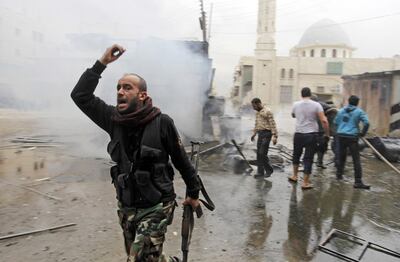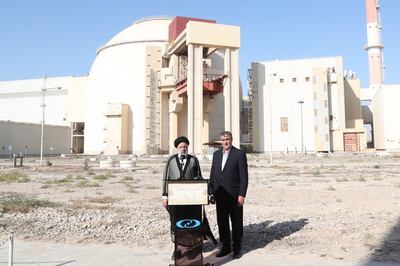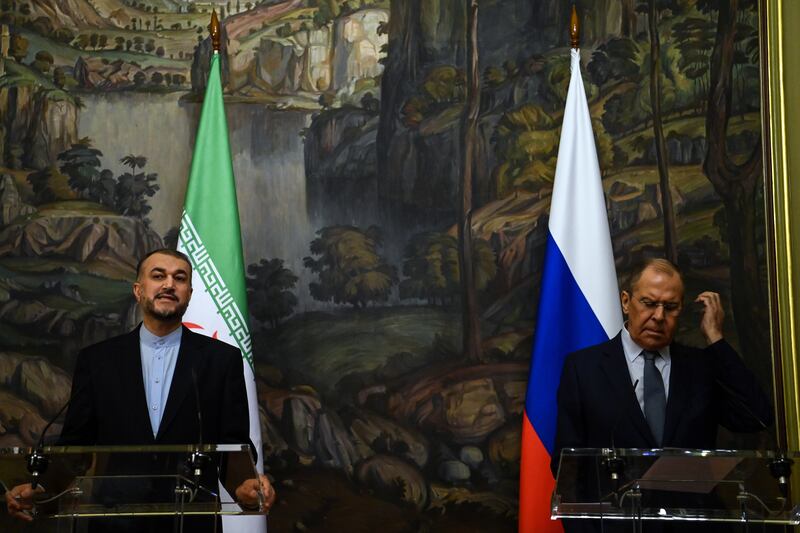Russia seems to be walking a diplomatic tightrope, as it attempts to reconcile its relations with two countries that are adversarial towards each other: Israel and Iran.
Moscow and Tehran are reportedly drawing a roadmap to conclude their “strategic co-operation” agreement. In reality, the existing relationship already goes beyond co-operation and is closer to being a strategic alliance – particularly in Syria, where Russia is allied to the Assad regime and needs support from Iran and Tehran’s Lebanese proxy, Hezbollah, to maintain its interests there.
Syria remains a strategic priority for the Kremlin, which is intent upon declaring the decade-long civil war there over next year. It is focused on “liberating” territories separately controlled by Turkish-sponsored and the US-backed rebels. Moscow also wants the Biden administration to recognise the Assad regime’s legitimacy. For, the regime’s survival is key for Russia to maintain its forces in Syrian bases – even if that means accepting the strong relations between the regime and Tehran as a reality.
This is where Israel, Syria's neighbour to its south-west, comes in.
Until recently, there seemed a “balance of silence” in Syria, with Moscow, Tehran and Damascus seemingly ignoring some of Israel’s military activities inside the country, in return for Israel looking the other way when it comes to Iranian and Hezbollah operations there. Meanwhile, Iran and Hezbollah have maintained silence over Russia’s consent to the Israeli occupation of the Golan Heights.
Increasingly closer ties between Russia and Israel seem to have disrupted this silence, with the Iranian leadership far from impressed with this development. Tehran, after all, has always claimed to lead the so-called resistance against Israeli advances, including by mobilising loyalist armies led by Hezbollah, across the Arab world.
During his visit to Moscow, Iranian Finance Minister Hossein Amirabdollahian warned that the region would not tolerate any more escalation and provocation, purportedly from Israel. He said Tehran would not accept any geopolitical shifts or “Zionist” presence across it. He was citing the Southern Caucasus, where tensions are increasing between Iran and Azerbaijan, a country whose government has Turkish and Israeli backing.
Mr Amirabdollahian is said to have made clear Tehran’s opposition to Moscow’s commitment vis-a-vis Israeli security. This, in turn, seems to have stirred anxiety in Israel – thereby putting Russian diplomacy in a bind.

While Moscow will appear to allay Iranian concerns by taking a step back in its overtures towards Israel, ties remain sound between Russia and Israel. This will almost certainly mean continued Russian commitment towards preventing Iran and Hezbollah from activating their resistance front out of the Golan Heights. The escalation of tensions between Iran and Israel could, nonetheless, undermine Russian efforts to develop the existing de-escalation arrangements between the countries.
In any case, the Iranian regime will have viewed Mr Amirabdollahian's Moscow visit as a win for Tehran.
Russia, meanwhile, is also a key player in the American-led bid to revive the 2015 nuclear deal between Iran and the global powers. Shortly before Mr Amirabdollahian's visit to Moscow, US Secretary of State Antony Blinken had spoken to Russian Foreign Minister Sergey Lavrov. During their conversation, Mr Blinken had reiterated the Biden administration’s desire to resume the Vienna talks – but only as long as Tehran were to set no preconditions. America’s top diplomat had also warned that the situation now is different from the Obama era – when the deal had been signed. In other words, there would be a need to impose new boundaries on Iran’s nuclear programme.
This development is likely to hinder future negotiations, as would Iran’s demand that western banks unlock $10 billion worth of funds as a precondition for resuming the talks.

Russia has proposed a joint US-Russia-Iran framework to resolve such outstanding issues. However, tensions have recently escalated between Nato and Russia, as have a diplomatic crisis between Washington and Moscow.
Pressure is mounting on US President Joe Biden, who appears increasingly weak as he comes under European pressure to submit to Iranian demands. This climate is thwarting attempts to resume the Vienna talks. The finalisation of a deal with Iran – which Russia and the Europeans seem to want on Iran’s terms and on which the Biden administration faces both domestic and Israeli objections – could, therefore, either be provisional or prove fateful.
The tug-of-war in Syria has become enmeshed with the nuclear talks, with Moscow seeking to appease Tehran. But Iran’s flexing of muscles with both the US and Russia could slow down the train of regional accords. Only the regime knows whether it is really serious about pushing back against a power of Russia’s heft, or is simply making noise to get a better deal – both regarding its nuclear programme and its regional ambitions.
Perhaps, despite their overconfident demeanour in public, Iran’s leaders, too, are walking a diplomatic tightrope.





